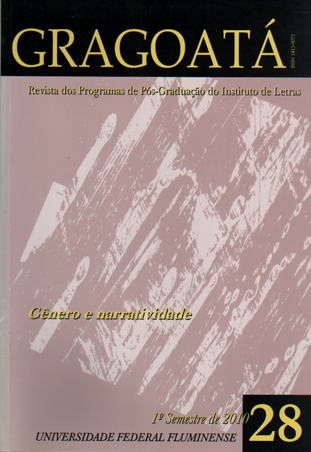Tensioning of voices in the newspaper front page: the “Episódio Aracruz” in the first page of “Zero Hora”
DOI:
https://doi.org/10.22409/gragoata.v15i28.33100Keywords:
Dialogical relationships. Printed newspaper first page. Episódio AracruzAbstract
This paper aims to make a discursive analysis of March 12, 2006 first page of Zero Hora (RS), focusing on the ways dialogical relationships are established in order to identify characteristics and sense effects regarding the coverage of an event of great repercussion in “gaucho” media that we call for research shake “Episódio Aracruz”. The analysis is based on theoretical grounds developed by the Bakhtin Circle and establishes an interlocution with an ergological viewpoint. For methodological reasons, the analysis is organized in two interdependent groups. The first one resents a reflection concerning the cover of the periodical studied and the effects produced by visual resources there used (such as color, space and graphic elements). The second one analyzes verbal resources selected for the construction of the cover, considering (a) names used for the lead regarding Episódio Aracruz; and, succinctly, (b) verbal elements used in other leads, that, because of being constituents of the same graphic project, keep an interlocution and, thus, produce different effects. The results of the reflection indicate that the analyzed utterances, by not following the guidelines of newspaper style manuals, are highly evaluative in the intrinsic relationship between the verbal and visual domains, disclosing the relative stability of genres and ratifying the lacunar statute of work norms. In this discursive process, the position of the newspaper emerges in a confusion of voices in the covering of Episódio Aracruz, allowing a resonance amongst other dialogical relationships, the rupture with social movements, what demands a critical reading for understand senses circulating therein.
Downloads
Downloads
Published
How to Cite
Issue
Section
License
Authors who publish in Gragoatá agree to the following terms:
The authors retain the rights and give the journal the right to the first publication, simultaneously subject to a Creative Commons license CC-BY-NC 4.0, which allows sharing by third parties with due mention to the author and the first publication by Gragoatá.
Authors may enter into additional and separate contractual arrangements for the non-exclusive distribution of the published version of the work (for example, posting it in an institutional repository or publishing it in a book), with recognition of its initial publication in Gragoatá.

Gragoatá is licensed under a Creative Commons - Attribution-NonCommercial 4.0 International.











